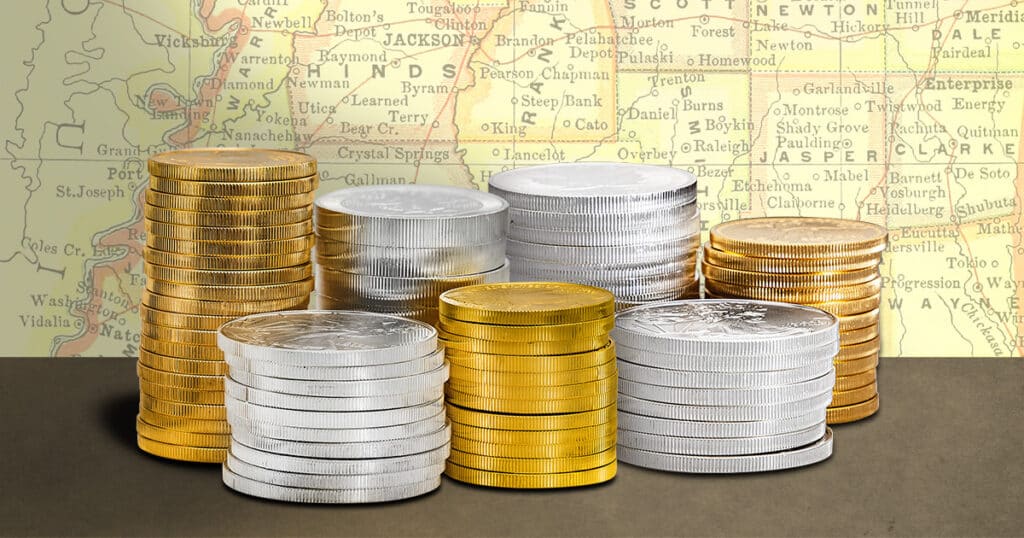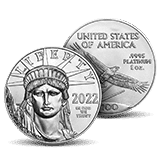
Mississippi is now the 43rd state to eliminate sales taxes on gold and silver coins and bullion. April 2023, Mississippi Governor Tate Reeves signed Senate Bill 2862 to “exempt from sales taxation sales of coins, currency, and bullion” – officially repealing the sales tax on precious metals such as gold, silver, and platinum. This means that purchases of these metals are no longer subject to the state’s 7% sales tax.
The bill is designed to encourage investment in precious metals by removing one of the tax burdens on investors by treating precious metals more like money than commodities. Proponents of the measure argued that Mississippi was at a competitive disadvantage compared to other states that did not tax precious metals and that repealing the tax would make the state more attractive to investors.
How are Exempt Coins, Currency, and Bullion Defined?
The new law exempts the sale of “coins, currency, and bullion” from the state sales tax. The law defines “bullion” as “a bar, ingot, or coin” that is:
- Manufactured, in whole or in part, of gold, silver, platinum, or palladium.
- That was or is used solely as a medium of exchange, security, or commodity by any state, the United States Government, or a foreign nation.
- Sold based on the intrinsic value of the bar, ingot, or coin as a precious metal or collectible item rather than its form or representative value as a medium of exchange.
To qualify for the exemption, “coin or currency” must be:
- Manufactured, in whole or in part, of gold, silver, other metal, or paper;
- That was or is used solely as a medium of exchange, security, or commodity by any state, the United States Government, or a foreign nation; and
- Sold based on the intrinsic value of the coin or currency as a precious metal or collectible item rather than its form or representative value as a medium of exchange.
The newly signed bill will go into effect on July 1, 2023, and applies to bullion purchases, coins, and numismatic items made in Mississippi. The exemption does not apply to jewelry or other decorative items made from precious metals.
State Sales Tax Background
Prior to 1933, the United States was on the gold standard, and precious metals were widely used as currency. At that time, there were no sales taxes on precious metals because they were considered a form of money rather than a commodity.
However, after the US went off the gold standard in 1933, precious metals were no longer used as currency and began to be subject to sales taxes like other commodities. States began to impose sales taxes on precious metals in the mid-20th century to raise revenue and fund government services.
Over time, some states realized that taxing precious metals might discourage investment in these assets and began to exempt them from sales taxes. The first state to do so was Arizona in 1989; since then, several other states have followed suit.
Today, there is a patchwork of different sales tax laws regarding precious metals across the United States. Some states exempt precious metals from sales taxes entirely, while others impose partial or no exemptions. The tax treatment of precious metals can also vary within a state depending on the type of metal and the form in which it is sold (bullion, coins, jewelry, etc.).
Some states in the U.S. still impose taxes on gold and silver bullion, which can make it harder for financially savvy individuals to consider metal investments as part of a diversified portfolio, given the added cost burden. But now, several U.S States are pushing legislation to repeal this tax, paving the way toward more accessible investment opportunities within physical metal assets.
States that have not yet eliminated sale tax on precious metals: Hawaii, Kentucky, Maine, New Jersey, New Mexico, and Vermont.
It is worth noting that while Mississippi no longer charges a sales tax on precious metals, investors may still be subject to federal taxes on capital gains from the sale of these assets. Investors should consult with a tax professional to determine their tax liabilities.




